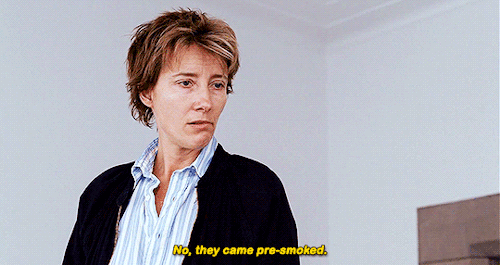
Karen Eiffel is a bestselling novelist.
Her body of work consists of Detractors of the Living, The Widow's Calendar, Grieving, The Poetry of Trainwrecks, Four Black Veils, The Agony of Everything, The Muffled Traces of a Boyish Laugh and now Death and Taxes.
Noted literary critic Max Weller describes Eiffel as 'a new standard for English-speaking authors...a touchstone set too low.'
Eiffel does not correspond with fan mail. Both in and out of her fiction, she has 'maudlin charm'. When asked on the Darlene Sunshine Show if her glass is half-full or half-empty, Eiffel simply replied 'I keep knocking it over.'

Karen Eiffel herself is a fiction. She is a character created by Zach Helm, Marc Foster and Lindsay Doran and brought to vivid life by the incomparable Emma Thompson in the 2006 Columbia Pictures film Stranger Than Fiction.
We are first introduced to Eiffel in blue and white striped pyjamas and a black cardigan that has seen better days. Like most cinematic depictions of genius writers, Eiffel is blocked. She smokes cigarette after cigarette and disposes of them in crumpled tissues dampened by spit. She is really not doing well.
Then again it must take a depressive mindset to bring eight likeable characters to life just to murder them in beautiful and poetic ways. These include Edward, a civil engineer who suffers a heart attack during rush hour and Helen, a schoolteacher who passes a day before summer vacation.
Eiffel's latest victim will be Harold Crick, an IRS agent though how his fate will be sealed eludes the author for the moment.
Even so Death and Taxes is due to Banneker Press and they have sent out Penny Escher, a no-nonsense assistant to apply structure to the ongoing issue.
However poetry and index cards will not do in this case. To Eiffel, writing should come 'inexplicably and without method.' Then again this does not preclude the following of whims such as seeking doomed patients in hospital emergency rooms or reading 'fantastically depressing' books about suicidal leapers.
Eiffel is herself a woman in free fall. Her only notable solace comes from the letters of Literary Theory Professor Jules Hilbert, to whom she presumably cannot bring herself to respond.
It seems that Eiffel needs a shock to take her out of her head, a startling revelation of some kind. A grand epiphany.
Little does Eiffel know, epiphanies can come from imagining the epiphanies of other people.
After all, there is great power in fiction: something so strange that it can even change the truth.

The character Karen Eiffel and the film Stranger Than Fiction (2006) are the intellectual property of Columbia Pictures. This essay does not claim ownership of either.
Thanks for giving us the correct quote - the faint praise - by noted critic Max Weller directed at Eiffel's writing.
ReplyDeleteI spent quite a bit of time trying to decipher the quote in the movie. It's rather muffled... rather like "the traces of a boyish laugh"!